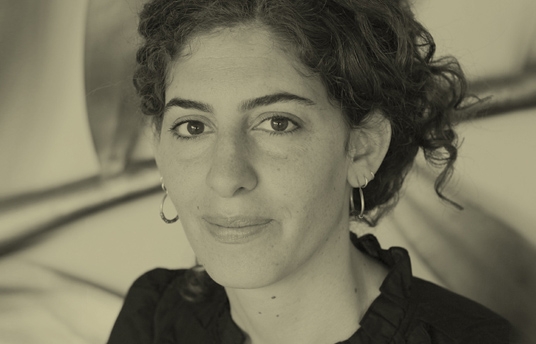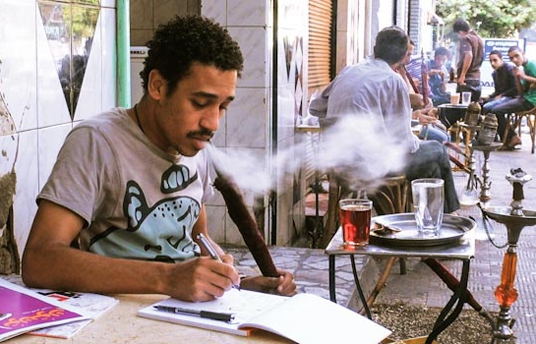People in Film: Annemarie Jacir and Hala AlAbdalla
Oct 09, 2012

Filmmakers are on their way to the sixth Abu Dhabi Film Festival, which begins on Thursday.
Palestinian director Annemarie Jacir and Syrian filmmaker Hala AlAbdalla are two of the region’s prominent talents heading to the UAE with their films. ‘When I Saw You’ is Annemarie’s second feature film. Set in 1967 Jordan, the story follows the life of a young Palestinian refugee, Tarek. ‘As If We Were Catching A Cobra’ is topical documentary on the art of caricature in the Arab world.
We interviewed both filmmakers.
Annemarie Jacir
DFI: Venice and Toronto featured the largest ever number of Arab films in their programmes. Is this a reflection of increasing quality or quantity in Arab cinema?
Annemarie: Arab cinema has just been growing and becoming more and more interesting; I think now there’s a bunch of new and interesting films out. Last year, people were saying it was a bit of a dead year – there wasn’t a lot going on. I remember I was at the Dubai Film Festival last year where the head of the jury said: ‘The Arabs are making a lot of revolutions this year, but not any films.’ There was a quiet time. Maybe people were working. In countries like Tunisia and Egypt [the revolutions] definitely affected their film industries, but really good things are happening again.
DFI: What is ‘When I Saw You’ about?
Annemarie: It follows the story of a mother and son who have just become refugees from Palestine. The boy doesn’t buy the whole concept – he doesn’t understand why they’re there, why they have to wait. They’ve been split up from the father in the chaos of war, and the mother is just trying to protect the only thing left, which is her son. He’s the kind of kid who’s very smart – he asks too many questions that adults can’t always answer. He eventually decides to take things on himself.
DFI: That main character is 11 year old Tarek, played by Mahmoud Asfa, a refugee with no acting experience. You found him and trained him up. How was that?
Annemarie: We found him and he was great to work with. I learned a lot from him…We worked for months together, and it took a while at the beginning to not have him ‘act’. What he knew about acting is what he saw in soap operas, so he thought that’s what I wanted from him. It was mostly just bringing him down, getting him to be himself and working a lot on who he was.
Tarek is a refugee, and is very attached to home. Mahmoud has lived his life in a refugee camp, and his parents are refugees… I had him draw his home endlessly; every item in the house, what’s inside the refrigerator, his bedroom, what’s under the bed, what kind of conversations does he hear from his parents…all of this background was the most important thing and mostly what we worked on to prepare him for that.
DFI: Why was telling a story from 1967 more important than making a film about today’s events?
Annemarie: When I started writing it was before revolutions were happening in the Arab world. But I think somehow, without knowing it, it’s tied together. I wanted to make a film about 1967 because it’s such a crucial year in our history – but not in a nostalgic way. I was searching for something to go back to this time period that was full of hope; regular people felt that they had agency in their lives, to change things.
DFI: The sets on your film are so realistic. How did you manage to recreate the camps?
Annemarie: I did a lot of research in the writing phase, a lot of visual research…gathering photographs, films, newsreels. There’s a lot of stuff from the refugee camps…It was looking at that material with my cinematographer, with the art director, gathering all of that.
Also, the fighters in the location that we shot – Dibeen – that’s actually the real location where the Palestinian fighters were. There are a lot of images of them; [the fighters] did become superstars – they got photographed a lot. I had a good visual library and reference. We had to build the refugee camp, because today they don’t look like that.
Hala AlAbdalla
DFI: What is ‘As If We Were Catching A Cobra’ about?
Hala: The film was originally trying to talk about the art of caricature in Syria and Egypt, the relationship of caricatures with the press, freedom of expression, and censorship. With time it became more about the revolution in Syria and Egypt and how can one take advantage of freedom through caricature.

Scene from 'As If We Were Catching A Cobra’
DFI: You enjoyed the premiere in Toronto. Was this the ideal location for your film’s launch?
Hala: I really wished the first screening would have been in Syria, but this is now impossible. The film has premiered in Toronto and it seems many people are interested in the film and its distribution. This is all very positive for me, that we can talk in this troubled period all over the world and people seem interested in documentary films.
DFI: How do films help spread information?
Hala: This [film] is also an opportunity to talk about the revolutions in Egypt, Syria and the rest of the Arab world. Documentary films provide a means to reflect the reality and let people engage in what’s happening in Syria. I hope this [film] will be beneficial and trigger the audience’s curiosity.